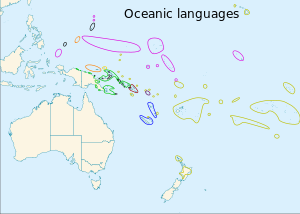The family of Southeast Solomonic languages forms a branch of the Oceanic languages. It consists of some 26 languages covering the Eastern Solomon Islands, from the tip of Santa Isabel to Makira. It is defined by the merger of Proto-Oceanic *l and *R. The fact that there is little diversity amongst these languages, compared to groups of similar size in Melanesia, suggests that they dispersed in the relatively recent past.[1] Bugotu, Gela and "supposedly" Lengo are three of the most conservative languages.
| Southeast Solomonic | |
|---|---|
| Geographic distribution | Eastern Solomon Islands |
| Linguistic classification | Austronesian
|
| Proto-language | Proto-Southeast Solomonic |
| Subdivisions |
|
| Language codes | |
| Glottolog | sout2853 |
 Southeast Solomons | |
Languages
editAccording to Lynch, Ross, & Crowley (2002), the structure of the family is as follows:[2]
- Southeast Solomonic family
- Bugotu–Gela–Guadalcanal family
- Longgu–Malaita–Makira family
Basic vocabulary
editBasic vocabulary in many Southeast Solomonic languages is somewhat conservative, unlike Northwest Solomonic forms, many of which have no Proto-Oceanic cognates.[3] Below, Gela and Arosi are compared with three Northwest Solomonic languages. Aberrant forms are in bold.
References
edit- ^ Lynch, John, Malcolm Ross & Terry Crowley. 2002. The Oceanic languages. Richmond, Surrey: Curzon Press.
- ^ Lynch, John; Malcolm Ross; Terry Crowley (2002). The Oceanic languages. Richmond, Surrey: Curzon. ISBN 978-0-7007-1128-4. OCLC 48929366.
- ^ Pawley, Andrew. Explaining the Aberrant Austronesian Languages of Southeast Melanesia: 150 Years of Debate. Journal of the Polynesian Society, The, Vol. 115, No. 3, Sept 2006: 215–258.
Further reading
edit- Tryon, Darrell T. and B. D. Hackman. 1983. Solomon Islands Languages: An Internal Classification. (Pacific Linguistics: Series C, 72.) Canberra: Research School of Pacific and Asian Studies, Australian National University